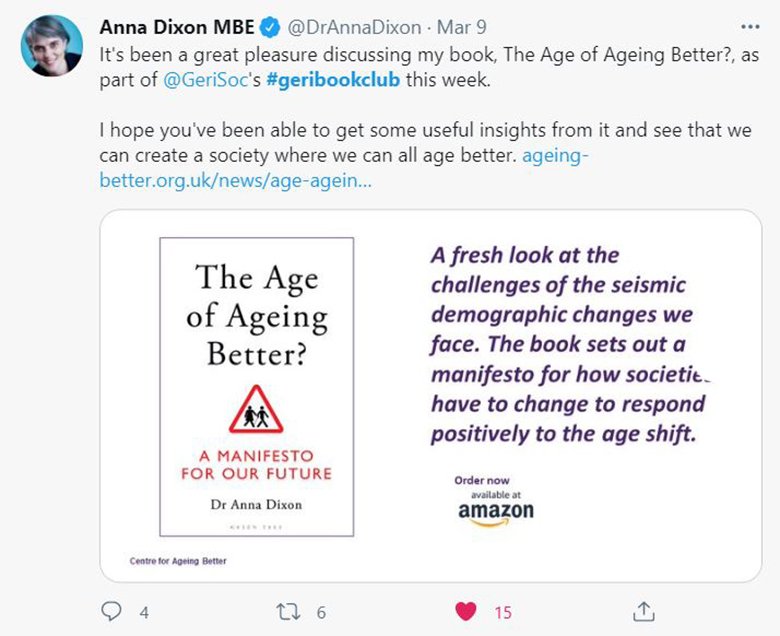Charlotte Squires is the BGS Digital Media Editor and host of #geribookclub, in addition to working as a specialist trainee in geriatric medicine. She tweets from @charsquires.
The BGS Twitter #GeriBookClub met once again on March 8th, to discuss ‘The Age of Ageing Better’, written by Anna Dixon MBE, who is the Chief Executive of the Centre for Ageing Better. We were delighted that Anna was able to join us for our discussion too, an opportunity we greatly value.
Our early discussion considered the association of health inequalities and ageing. Participants noted that this issue has significant relevance to ageing, noting for example the large disparity between disability-free life expectancy between different social groups, and the way this further drives issues by impacting retirement age, for example. Whilst these themes are commonly encountered in clinical practice centred on older adult care, it was also noted that health inequalities may also mean that some people never reach an age where they require geriatrician-led services. It was also noted that these issues disproportionately affect women, who are more likely to have additional caring responsibilities, career gaps, and lower pensions which can later impact choices and decisions.
Another topic was the role of retirement and how different people approach this. It was noted that retirement can be perceived as a difficult change of role, with several participants noting the experiences of family members for example. We also discussed the role of older adults in volunteering and community-orientated activities, which was highlighted in the book as being substantial both in terms of hours, but also in terms of the wider financial savings for the state associated with these voluntary activities. It was felt therefore that more recognition should be given towards roles outwith standard employment, given their positive contribution to society. It was also felt that workplaces need to increasingly consider both the needs and skills of older workers, with some encouraging local examples described by participants, such as support for women experiencing menopause.
In terms of barriers to older adults, technology was noted to be a current key consideration. Several people felt that internet use now qualifies as an important activity of daily living, and it was also noted that difficulties engaging with technology may limit people’s options to access healthcare, particularly in the recent context of emerging remote consultations. This was felt to be an opportune target for innovation both in specific health service terms, and in the wider community. There were some interesting points around future planning and proofing, for example in terms of accessible housing design, with features such as wider corridors benefiting a wide range of people, not just those who are frailer, or who have poor mobility.
Overall, this book offered a comprehensive and far-ranging view of issues allied to ageing in the UK (though focussed on England), considering population aspects, employment, healthcare, future planning, and societal attitudes. I liked that chapters covered standalone topics, and also that it included case histories, and illustrations of services in other countries. I would recommend it to anyone interested in the wider context of ageing, in addition to the specific elements focussed on healthcare.
Our next #GeriBookClub is a fiction pick, and we are excited to have selected ‘Mr Loverman’ by Bernadine Evaristo, for our next meeting on Tuesday May 11th, at 8pm sharp. All of our chosen books are available in print, e-read format, and audio format, with a target price point of under £15. We also encourage use of both public and hospital libraries, when able to do so in line with restrictions.

